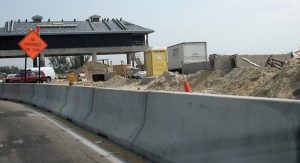
Fluctuating Speed Limits
March 27, 2018
When 3PL Demand Exceeds Capacity
April 17, 2018For Whom the Bridge Tolls.

Always Under Construction
There’s always the dreaded—and the necessary—highway improvement bill.
Dreaded because there is typically some sort of trade-off in order to secure funding for roads. As in: some other program or project will be reduced, or a new tax will be introduced.
Necessary because, well, highway improvement is a major part of our infrastructure, and infrastructure is what helps get us where we need to go and make our economy move. In a big way.
Yes, we need to pay for all of it. Somehow. There’s an idea floating about that we should make every road a toll road. It’s a charge-by-the-mile structure to counter the (not unreasonable) idea that most roads are essentially free. The more we use them, the more wear and tear they have, and the more they need to be maintained.
Nick Stockton’s recent essay in Wired magazine explores some of the background of how we got into the infrastructure mess. He writes:
“In 2017, the American Society of Civil Engineers gave US road infrastructure a D grade, noting that one out of every five highway miles is in poor condition—potholed, pitted, poorly painted lines, the full catastrophe. This is because there’s no money to fix them. Federal gas taxes were supposed to keep the Highway Trust Fund afloat, but politicians have refused to raise them since 1993.”
The burden (and the necessity) often falls to the states to find a workaround to fixing bridges and potholes and other infrastructure essentials. In many instances, funding levels can swing dramatically between counties.
(If you’ve ever felt your tires go from a rougher ride to a suddenly smoother ride, chances are good you’ve just crossed into a county that passed funding and spread new asphalt, stopping more or less right at the end of their county line.)
With that in mind, a number of states are, in fact, creating toll roads out of freeways in order to raise that dreaded and necessary funding. That list includes new tolls in Texas, Florida, Virginia, North Carolina, and Colorado.
I-29 contains 750 miles of interstate, from Kansas City, MO to Pembina, North Dakota. In Iowa, there’s now talk of turning the Hawkeye State’s part of I-29 into a toll road in order to fund a state highway improvement bill.
So, you section off a portion of your ribbon of highway. The irony is that what slows us down—funneling through the toll booth collection—is what eventually will help maintain the integrity of the road.
Our workarounds sometimes become the new standard.

